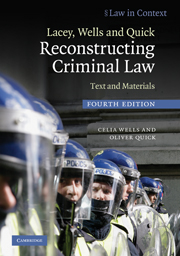Book contents
- Frontmatter
- Contents
- Preface
- Table of cases
- Table of statutes
- Section I Approaching Criminal Law
- Section II Law, Order and Security
- 4 Social and Political Constructions of Disorder
- 5 Securing Order
- 6 Public Order
- 7 Criminal Law and Justice
- Section III Interpersonal Violence; Drugs and Alcohol Abuse; Offence Preparation and Participation
- Section IV Property and Propriety
- Section V Regulating Sexuality and Bodily autonomy
- Section VI Making a Killing
- Bibliography
- Index
- References
5 - Securing Order
Pre-emptive Measures
from Section II - Law, Order and Security
Published online by Cambridge University Press: 05 June 2012
- Frontmatter
- Contents
- Preface
- Table of cases
- Table of statutes
- Section I Approaching Criminal Law
- Section II Law, Order and Security
- 4 Social and Political Constructions of Disorder
- 5 Securing Order
- 6 Public Order
- 7 Criminal Law and Justice
- Section III Interpersonal Violence; Drugs and Alcohol Abuse; Offence Preparation and Participation
- Section IV Property and Propriety
- Section V Regulating Sexuality and Bodily autonomy
- Section VI Making a Killing
- Bibliography
- Index
- References
Summary
The trend towards preventive justice
The balance between reacting and preventing in criminal law and justice appears to be undergoing a radical shift. That there have always been elements of prevention is clear from the common law powers of arrest for breach of the peace and statutory binding over orders (see below). As the moral panic literature discussed in Chapter 4 shows us, threats may manifest from all sorts of sources, they will be amplified by media portrayals, and then subject to attempts at containment by governments. The rise in surveillance technology and an increasing emphasis on managing the fear of crime as much as dealing with crime itself have given rise to a number of new measures aimed at establishing a sense of security from threats. Unlike binding over powers, the new preventive orders initially targeted individuals belonging to relatively specific groups. They were intended to be used against football hooligans, sex offenders or suspected terrorists. But they have now taken on new generic forms the clearest example of which is the anti-social behaviour order. All of these have in common that they are aimed at named individuals. Many of these measures are dependent on CCTV surveillance. In the next extract, Zedner captures the overall trend as a move towards pre-crime rather than post-crime.
- Type
- Chapter
- Information
- Lacey, Wells and Quick Reconstructing Criminal LawText and Materials, pp. 144 - 159Publisher: Cambridge University PressPrint publication year: 2010



